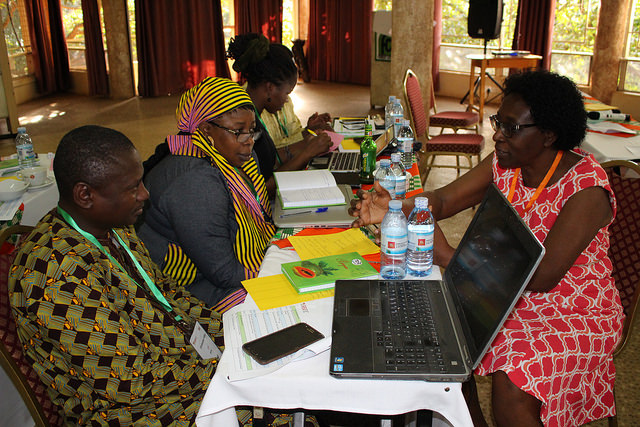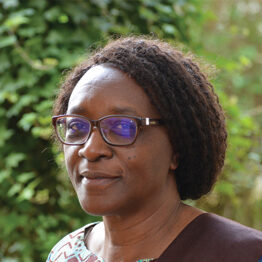When ICRISAT asked us to run our 14-day Gender-Responsive Plant Breeding course for scientists involved in its Tropical Legumes III project (TLIII) with only a fraction of the usual budget, I thought it couldn’t be done! The budget is too small, we can’t cover all the content; participants won’t have enough time for hands-on application… these were just some of the things that went through our minds. But after several months of engagement with Dr. Esther Njuguna-Mungai, the Senior Gender Scientist leading the ICRISAT gender component of TLIII, we decided to take on the challenge. The 14 days were condensed to 6 days, and the first GREAT customized course was born.
What clinched the decision was that we were at the time exploring ways to sustain the GREAT course when the Bill and Melinda Gates Foundation project grant ends in 2020. We were ready to venture into new ways of doing things—and we saw ICRISAT giving us an opportunity to try it out. Dr. Hale Tufan, the GREAT Co-PI from Cornell University kept saying—this is very important to GREAT, we have to make it work.
What is wonderful is that it has really worked! Breeders and social scientists alike attested to the transformational experience during the six days.

Margaret Najjingo Mangheni, GREAT Co-PI and Professor at the College of Agricultural and Environmental Sciences in Makerere University, discusses mixed methods data integration with participants from the Institut d’Economie Rurale (IER), Mali. Photo provided.
“After attending this training course, I have come to realise that as a social economist I have to put on a gender lens whenever doing research whose outcomes will benefit all stakeholders including women and men. Quantitative research alone cannot bring out the complete story without the qualitative part,” said Chris Sebbata, an Agricultural Economist working with the Uganda groundnut breeding team. “Many times, as a social economist, I have always believed in the numbers to explain many agricultural issues without realizing that the qualitative part is as important as the quantitative and that the two are complementary.” Another testimonial in appreciation of the training was shared by Happy Daudi, a groundnut breeder from Tanzania:
“When conducting the Participatory Varietal Selection (PVS), I considered the number of male and female participating without taking into account the voice of both gender groups which could increase the adoption rate. In addition, gender issues didn’t come in planning activities but only appeared in the middle of activities and in the report when we were supposed to show how many men and women participated. I thought that by writing that demonstrated that I was gender responsive. From this GREAT-TL III gender training, I acquired good knowledge and skills, and going forward, the Tanzania groundnut breeding program will consider real gender and not the number of female and male participants during the PVS.”
The attendees were not the only one who gained valuable lessons. The project team now also have better insights on how we can expand the reach of GREAT.
One of these lessons is that flexibility matters: the ability to listen and discern the participants’ needs during their learning journey and change the content and process to meet the evolving needs. It helps to have the leader from the client organization present in the room during the training. Dr Esther Njuguna understood the context of TLIII very well and would make periodic interventions through short presentations and give advice during debriefs to guide the GREAT team on what modifications were needed. She ensured that the training remained focused on assisting research teams to understand how to measure gender yield gaps, identify the causes of the gaps and formulate corrective interventions. She quickly joined the trainer team and after a few days you couldn’t tell the client from the contractor—together, we grappled with the challenge of applying the gender knowledge and skills towards the practical reality of breeding. From lectures, plenary and group discussions, case studies, we worked with teams one on one to mentor/advise while they reflected on shortcomings in their original project designs and how to use the learning to turn projects around.
Having experienced trainers able to think on their feet and quickly change content to respond to unfolding needs was critical—it was gratifying to see the phenomenal reception to Dr. Brenda Boonabaana’s impromptu presentation on women’s empowerment.
The learning from this course is valuable. This experience gives us confidence that developing customised spin-offs from the main GREAT course at Makerere University is a viable strategy to sustain the GREAT project. As Dr. Njuguna advised, GREAT should be ready to plan flexible short duration courses on topics of interest to different clients—for example, the big challenge of analyzing large qualitative gender datasets manually and computer-aided.
Finally, we now know that we don’t need a mega budget to conduct effective gender training and we can customize the training and meet the needs of diverse clients. This will incrementally lead us towards the GREAT vision of creating an inclusive and effective agricultural systems by addressing the priorities of both men and women in sub-Saharan Africa.
About the author

Margaret Najjingo Mangheni is associate professor of agricultural extension and innovation studies at Makerere University and co-principal investigator for GREAT.
For press inquiries or for more information, email us at great@cornell.edu.





